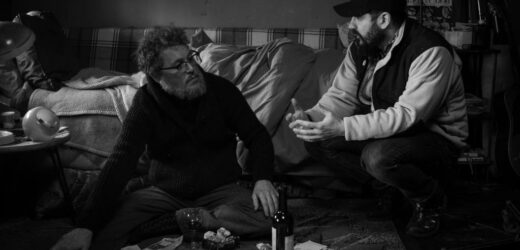Even if you don’t know the story of heralded photographer W. Eugene Smith or the Japanese fishing village of Minamata, you are likely familiar with the photograph Tomoko and Mother in the Bath. The 1971 black-and-white photo captures Ryoko Kamimura cradling her severely deformed daughter Tomoko, a victim of Minamata disease, in a Japanese bath. The photograph was one of many featured in a 1972 issue of Life magazine depicting the horrors of the disease, a form of Mercury poisoning that was caused by industrial wastewater from the Chisso Corporation’s chemical factory. Smith and his wife, Aileen Mioko Smith, lived in the town from 1971 to 1973 to document the effects of Minamata disease.
Now the story of the Smiths and Minamata has been brought to the big screen by filmmaker Andrew Levitas, starring Johnny Depp as Smith, Minami as Aileen and Bill Nighy as Smith’s editor Robert Hayes. Smith is portrayed as a challenging artist, initially reluctant to journey to Minamata, but eventually drawn into activism as he learns about the people and their stories. The film goes into a limited release on Feb. 11 in select theaters across the U.S.
At a Q&A for the film, Levitas and Depp (who is also a producer on the film) spoke about what compelled them to bring this story to the big screen. To make the film, Levitas and his crew reconstructed Minamata in painstaking detail, with Levitas’ goal to put the actors in what he calls “a 360-degree space where they could just live.” The result, says Depp, “Was almost like living in a documentary.”
I’d love to start at the beginning with Johnny, because I think you’ve been familiar with Eugene Smith’s work for some time. At what point did you know you wanted to tell not just his story, but specifically about his time in Minamata?
Johnny Depp: I had been somewhat fascinated by Eugene Smith for many years. His photographs were beyond intriguing, and then you read about his experiences in the Second World War and such. A wonderful photographer who’s since made her exit, Mary Ellen Mark, knew him and I asked her about him. She said that he introduced himself as W. Eugene Smith, and she said, “What does the W stand for?” And he said, “Wonderful.” And I thought that answer explained him in an instant; kind of curmudgeonly, he definitely had his slings and arrows. So he’s a fascinating character.
On top of that, then you learn about the horrors in Minamata and this crotchety old mean bastard going there to try and help these people and falling in love with these people. And [falling in love with] his wife in the process. This story should be known worldwide. These mistakes continue all over the planet and they should be looked at, there should be someone looking into these things. I feel so happy that we got to tell the story as the story needed to be told.
Andrew Levitas: I think what we both found so dynamic is there was a personality, like Johnny describes, but also an inner light and hope for mankind. The ability to see past the absolute worst of what people do to each other or how we treat our earth or how we treat each other and how we’ve set up our societies and still see that and express through the work and capture the moments where you could see the love and the absolute best of humanity.
There seems to be in today’s world, a view of: it’s over, it’s done. It’s doom and gloom, it’s the end, there’s nothing you can do, there’s no goodness. And then there’s the other side, which is: let’s just put our head in the sand and pretend it’s not there. In Gene’s case and hopefully in our case with this film, I think your goal is to inspire and offer a path through and also illustrate how beautiful it is to be human and how beautiful and how wonderful we can be when we look after each other and that’s never gone.
Depp: I believe that what Eugene Smith was is very close, very akin, to what Hunter Thompson was. There’s a great quote in the beginning of “Fear and Loathing in Las Vegas” that Hunter used by Dr. Johnson and it says: “He who makes a beast of himself gets rid of the pain of being a man.” So I think that Gene Smith, Hunter Thompson, those of that caliber, they are hyper, hypersensitive. But must protect themselves by putting layer upon layer upon layer to try to cover themselves and keep that warmth without losing themselves to as William Saroyan put it, the shame and degradation of the world.
Johnny, you’ve obviously played real people before but Gene Smith’s work is so important to so many people. Did you feel an extra responsibility taking on him and taking on this story?
Depp: Absolutely. Without question. When you’re portraying someone who either exists or existed, no matter who they are, you owe a debt to that person to play them responsibly and represent them responsibly. I include James “Whitey” Bulger in that. James Bulger didn’t wake up every morning and try to figure out just how evil he could be. He’s a far more complicated human being.
With Gene Smith it went to a great respect for him, but also to Aileen and what she carried on for years. It’s astonishing, it’s incredibly admirable, what she brought to the table — which was everything, no holds barred. So I felt a great debt and responsibility for Aileen as well.

Andrew, where did you even begin with your research? You have Eugene’s work, obviously, and Aileen was there to help you.
Levitas: There was an enormous amount of documentary footage and recordings. I did an incredible amount of digging with Aileen, where she basically told me her deepest, darkest secrets that she probably never shared with anyone. She understood that a film like this has the chance to make a difference and touch people, has a chance to change people’s view on the world, has a chance to inspire. So she was willing to give even more of herself, and she’s given quite a lot in her life. But she was willing to give even more of herself to try to see that happen. And so were the people of Minamata — the existing patients, the existing victims, existing relatives, parents of deceased who had lost their children. I went and visited and sat with them and had an ongoing dialogue with them. And they gave me such truth, real truth, real deep honesty and transparency. Because they too, felt that if there was a chance to stop the next Minamata, they had a responsibility to say something.
Though the film is set in the 1970s, it feels timelier than ever. Were you aware of that as you were filming?
Levitas: I think we were. We didn’t make this film for any reason other than it seemed like there was a way to tell a story through a very unique and creative and poetic lens that can actually be helpful. And the world has been going in the wrong direction for quite some time. So we all came because there was a calling to do it. We as a collective group understood how many people are struggling both in Minamata and around the world and wrestling with many of these same issues – industrial pollution, corporate welfare – and how this is [part of] a larger issue, which is that the little guy is getting squeezed by the big guy in pursuit of big money opportunities. And someone making a determination that the parts per million in terms of human life is actually a reasonable term to use.
Johnny, it sounds like you’re still learning new things as an actor, even today. What was your biggest challenge on this film or any other role?
Depp: I don’t know. The only reason I did many things are some of the choices that I made were because they were a challenge. I think if you step out the gate and do the same thing every time … well, it would drive me mental. It’s unfair to the audience or the viewer if I come out and I’m the same fella every time. I think it’s important that you try to find something that you can grab onto that maybe hasn’t been done to death and maybe you can come through a different pathway and find a different angle on the character. I think they’ve all been challenges, but I like that. I don’t know that I’ve stepped into a film that I wasn’t somewhat positive that there was every opportunity that I would fall flat on my face. But it’s important to go there.
This interview has been edited for length and clarity.
Source: Read Full Article


